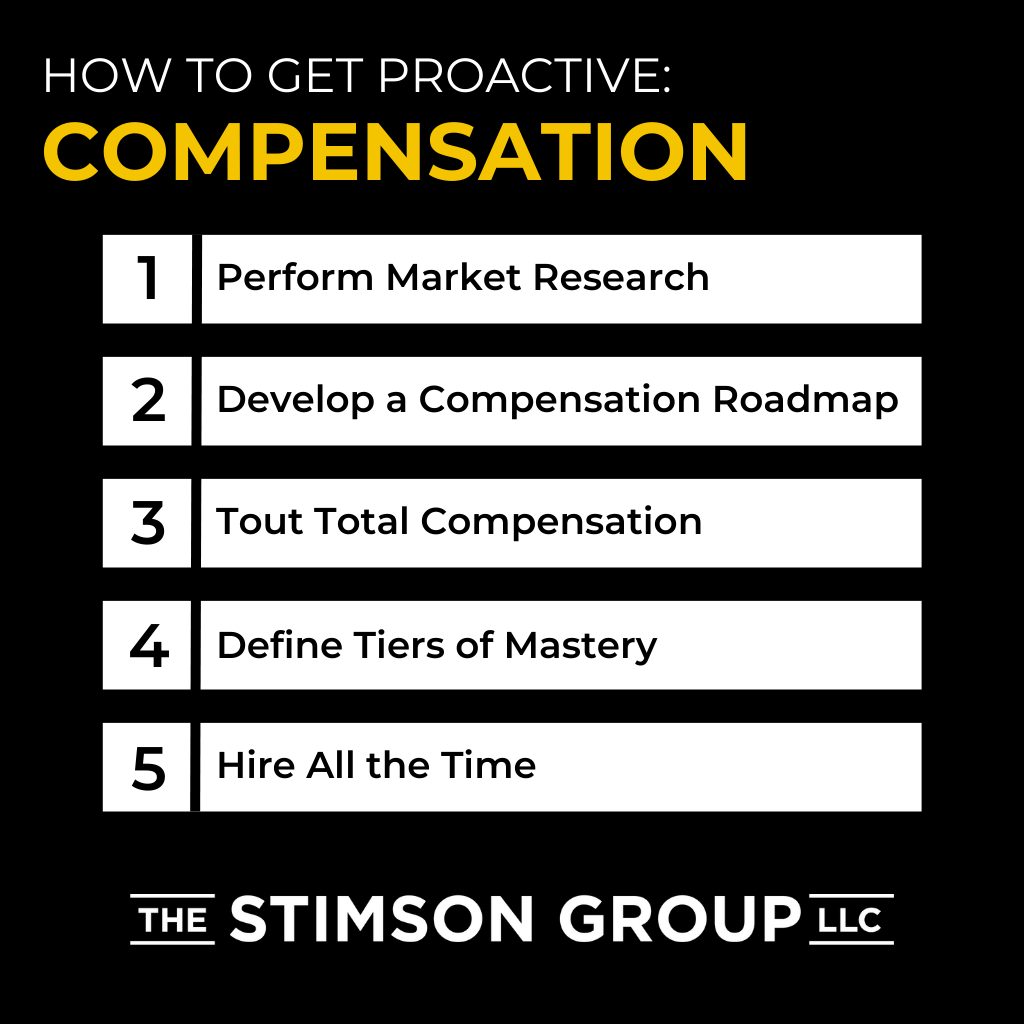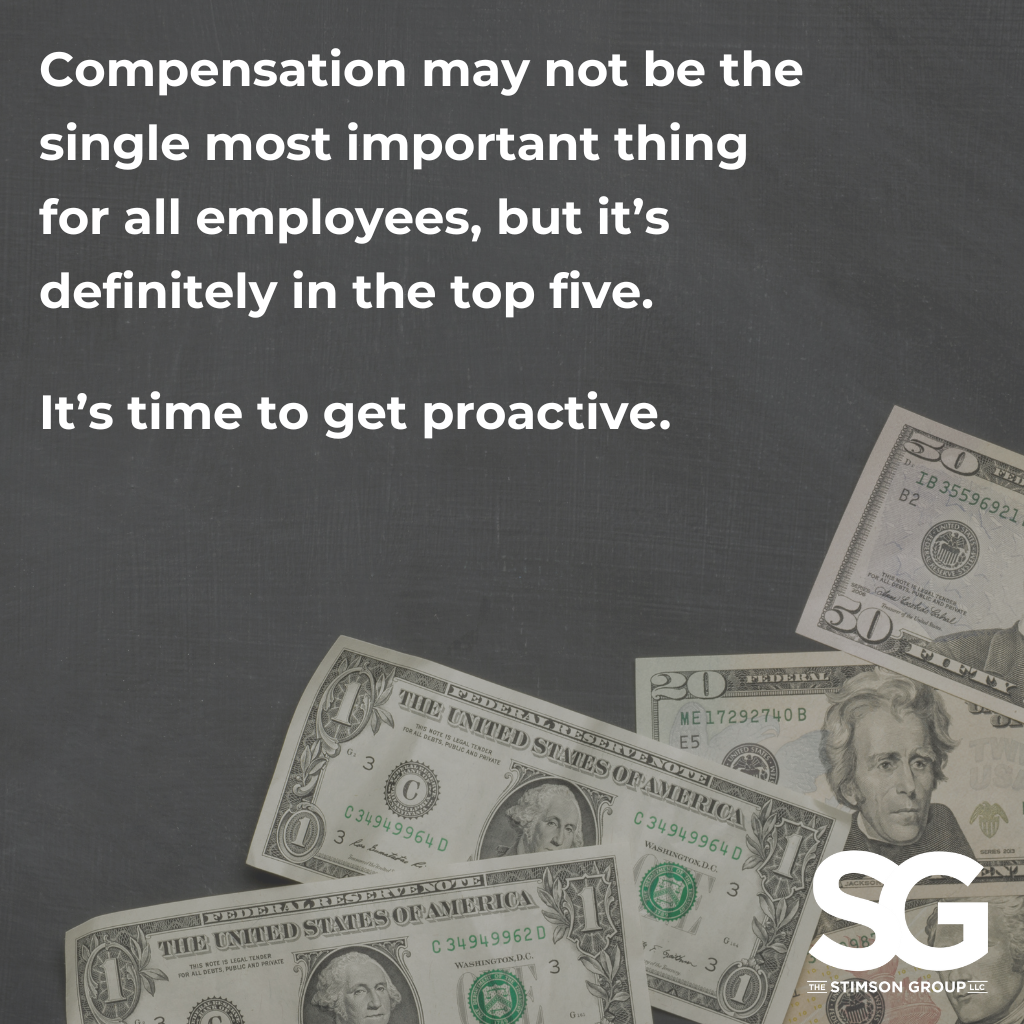
In the new normal, we’re in a seller’s market — and employees are noticing.
Your long-time employees are seeing what freelancers are making. They’re hearing what other companies are paying people with their talent and experience.
Maybe they directly ask for a raise, or maybe they share this market intelligence with you and hope you’ll do the right thing (still a raise).
This is often triggered when an individual employee uses market intelligence to specifically leverage their situation. Why? This self-inflicted wound happens because you haven’t gotten ahead of compensation.
If you haven’t experienced this yet, you will.
Your key employees are going to come to you and say, “Look, I could be making 30% more somewhere else.”
So the question is, how do you get out in front of this to retain your best people? Scroll on to find out.
Managing Personnel in the Current Environment
One possible knee-jerk reaction to the above is, “What?! You’re going to tell me I have to pay my employees more? I’m barely making money now!”
Pause. If you haven’t been making enough money in 2022-2023 to better compensate your employees, you have a much bigger problem than employee retention. You’ve subsidized what little profit you have with low pay to reduce costs so you can charge your customers less.
This is a death spiral in which you’re over-controlling costs and passing the savings on to your customers. If that’s where you are now, go back and take a look at my pieces on the post-pandemic operations model, assessment, and survival.
If you’re already up to speed and implementing all this, then you’re probably generating lots of profit. But maybe you don’t want to give it up because you’re finally making what you think you’re worth. In that case, what can you do to get ahead of the compensation conundrum?
If you want to minimize the extra cost but get the maximum impact from the effort, don’t worry. You can continue to increase your margins because there’s no limit to how much margin you can make in low-overhead business models!
So, you can already afford to pay your employees more. Feel good about it.
Many of you asked employees to stick with you through the pandemic. “We’re going to see the other end of this,” you said. “I’m going to take care of you.”
Guess what? We’re on the other end of the pandemic and your employees haven’t forgotten that conversation. Just because they’re loyal and not complaining doesn’t mean they’re going to hang around forever.

How to Get Proactive
Compensation may not be the single most important thing for all employees, but it’s definitely in the top five. It’s time to get proactive.
Perform Market Research
Before you jump into the conversation with your employees and make promises you don’t know how you’re going to keep, take a little time to do some research.
Start by looking at the hospitality industry as a whole, not just the AV segment of the industry.
If you focus only on your segment, you’ll just see other companies who haven’t updated their compensation. Looking at the broader industry will give you a larger sample to see what a project manager, an account executive, an operations manager, or a warehouse supervisor is worth. All these positions exist throughout the industry.
You can even look more broadly outside the industry at similar roles that seem complementary.
The more you educate yourself, the better you’re going to feel.
Also, be sure to satisfy your need to understand how much geography has to do with compensation. Personally, I think most people overthink or overvalue geography and regional cost of living when considering compensation. If you look at the variability across regions, you’ll find there’s not as much as you’d expect.
Develop a Compensation Roadmap
The next step also takes place before you ever have a conversation with your employees: design a compensation roadmap.
Here’s a story to illustrate the point:
I’ve been on the board of directors for a private school for 20+ years. At one point, our teacher compensation had gotten extremely low compared to the market. In other words, our exclusive private school teachers were making less than entry-level public school teachers.
We weren’t in any position to fix the problem overnight. So, we drew up a roadmap for the next five years. The map included tuition increases, cost management, and salary increases.
When we had the roadmap, we laid it out to the employees to get their buy-in and support, and so they knew things were going to get better.
Most of the teachers worked at the school because they loved the job and the environment. But the fact was, sooner or later the lower pay would force some of them to make hard choices. The roadmap gave them a reason to stay.
Your roadmap doesn’t need to cover five years. It should probably be two to three. You’re probably not so egregiously under market in compensation; maybe close to 20%. So, look at how you’re going to normalize pay for your employees over the next two or three years.
Be sure your plan includes annual compensation reviews so you can show people where they are on the roadmap and that you’re fulfilling your promises. This will lead to more timely and honest conversations about total compensation.
Tout Total Compensation
It’s important to evolve the conversation from base salary to total compensation. You still include base salary, of course, but also vacation time, sick leave, and healthcare. Be sure your employees understand the total value of their compensation package so that if they do make a comparison with another company, they’ll take their total compensation into account.
Somebody else might offer a higher salary, but they may not provide the great benefits or wonderful work environment you do.
Define Tiers of Mastery
Next, consider the roles in your company and define the tiers of mastery employees need in those roles to justify compensation.
Most of your employees are making more now than when they were hired simply by the fact that they’ve been there longer. When you add mastery into the equation, you get better skills and talents, and you do better at recruiting in the future. Why? Because you’re demonstrating a career path and at the same time raising your internal standards.
Hire All the Time
One more step in all this is to start hiring all the time. Recruiting is a core competency. In a job market without a lot of candidates, you need to be hiring for critical roles all the time.

How to Have the Conversation
Once you have your plan, it’s time to sit down with employees and have a conversation.
Start by acknowledging the current circumstances and making any necessary apologies. Then describe the ideal state you’d like to get to, and put your timeline on it.
Spend the rest of the conversation talking to each employee and describe the total compensation, the tiers of mastery for their role, the initial adjustments you’re going to make to compensation, and — this is important — what those adjustments are tied to.
This isn’t to attach strings to their compensation or get them to do something before you do the right thing. What you’re saying is this:
“I’m adjusting your compensation and putting you on this roadmap in exchange for you continuing to work on your mastery and continuing to be an excellent contributor to the organization. I’m also asking that, whenever necessary, we have an honest conversation if you have concerns about your compensation, your job role, or opportunities outside the business.”
For most of you, this is probably asking your employees to continue doing what they’ve always done — which means you have some people worth retaining.
When that’s not the case, this conversation puts employees on notice that you’ve taken a big step to retain them. It’s up to them to decide whether they’re interested in staying for the long term.
Conclusion
It’s your job to get out in front of employee compensation concerns. If you don’t, your employees will beat you to the punch. They’ll bring up the matter one by one, and it will be disruptive, emotional, and probably disappointing for someone.
You can avoid it all by staying out in front.





Leave a Reply